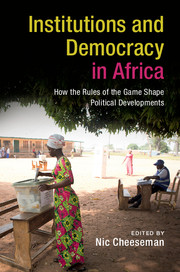Book contents
- Frontmatter
- Dedication
- Contents
- List of Figures
- List of Tables
- List of Contributors
- 1 Introduction: Understanding African Politics: Bringing the State Back In
- Part I Institutional Foundations
- Part II Law and Order
- Part III Elections, Parties and Political Competition
- Part IV Countervailing Institutions
- Index
- References
1 - Introduction: Understanding African Politics: Bringing the State Back In
Published online by Cambridge University Press: 05 February 2018
- Frontmatter
- Dedication
- Contents
- List of Figures
- List of Tables
- List of Contributors
- 1 Introduction: Understanding African Politics: Bringing the State Back In
- Part I Institutional Foundations
- Part II Law and Order
- Part III Elections, Parties and Political Competition
- Part IV Countervailing Institutions
- Index
- References
Summary
The question of whether formal political institutions such as the legislature, the electoral commission and the judiciary play a significant role in everyday political life is one of the most important debates in African studies. How we answer this question shapes not only our assessment of the prospects for democratic consolidation – which appear to be healthier if one thinks that political leaders are becoming ever more constrained by the rules of the game – but also how we understand and study the continent. If legislatures and judiciaries are largely irrelevant because they are powerless to check the authority of the executive, then Africanists do not need to devote much time to learning about them.
To date, a significant proportion of the literature has depicted a continent in which formal institutions do not perform as intended; rather, official rules are described as being weak and fragile, rendered vulnerable to executive manipulation by the salience of corrupt personal networks and ethnic politics. This line of argument reached its logical conclusion in Africa Works, the bestselling treatise by Patrick Chabal and Jean-Pascal Daloz, which effectively argues that the continent is ‘institutionless’ (1999). In making this argument they did not mean to imply that Africa lacks shared customs and norms that regulate behaviour in predictable ways. The strength of these kinds of informal institutions has been widely recognised in work on ethnicity, patronage and traditional authority. Rather, their argument is that formal rules such as constitutions and legal systems do little to shape political life, which is instead fashioned by social customs and “traditional” forms of political behaviour. In other words, Chabal and Daloz conclude that Africa lacks effective political organisations – that, to borrow Joel Migdal's well-known phrase (1988), it is a continent of ‘strong societies and weak states’.
Over the last twenty years, this position has become increasingly untenable. A number of Africanists have contributed to a body of work that documents processes of democratisation – cases in which elections and increasingly rule-bound politics lead to greater respect for civil liberties and political rights (Lindberg 2006), presidential term limits and transfers of power (Posner and Young 2007; Cheeseman 2010).
- Type
- Chapter
- Information
- Institutions and Democracy in AfricaHow the Rules of the Game Shape Political Developments, pp. 1 - 38Publisher: Cambridge University PressPrint publication year: 2018
References
- 8
- Cited by



